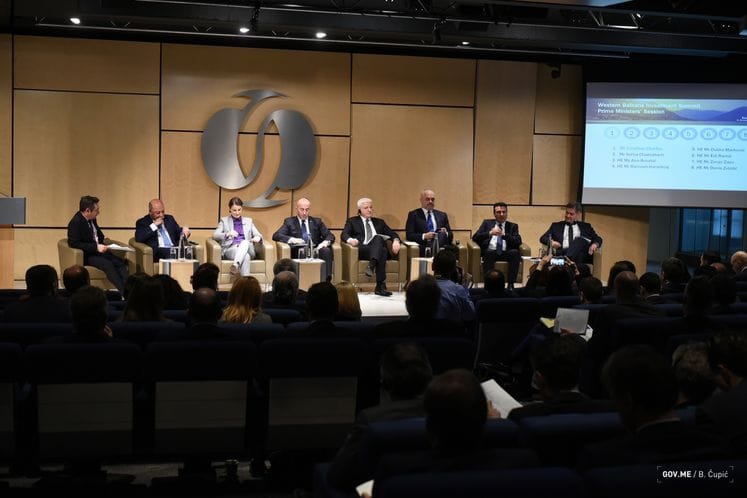- Government of Montenegro
PM Marković takes part in WB Summit in London: Adr...
PM Marković takes part in WB Summit in London: Adriatic-Ionian Corridor is top priority, Montenegro is safe investment destination

London, United Kingdom (26 February 2018) -- Prime Minister Duško Marković said at the Summit of the Western Balkan Six, taking place at the headquarters of the European Bank for Reconstruction and Development in London, that from Montenegro's standpoint, priority regional project is the Adriatic-Ionian Corridor, as well as the modernisation and expansion of railway infrastructure as a precondition for better economic integration and movement of people and goods, and linking to European corridors.
"The Berlin Process, complementary to the EU accession process, began with the Connecting Agenda, or the initiation of joint regional projects in the field of infrastructure. Infrastructure integration is a prerequisite for boosting economic integration, that is, the overall competitiveness of the region,” said the Prime Minister of Montenegro at a panel discussion.
Speaking about the region in the context of European integration, Prime Minister Marković stressed that each country has its own dynamics when it comes to bringing the standard of living closer to that of the EU. The standard of living measured by GDP per capita in Montenegro is at the level of 45% of those in the EU, while for the Western Balkans it is up to about 30% of the EU average.
"That is why it is important to strengthen regional economic cooperation, which should reinforce the stability of the region, simplify the functioning of the economy in the region and contribute to faster economic growth," said the Prime Minister, adding that the last year's Summit initiated further reinforcing of regional economic integration through the adoption of the Action Plan for the six Western Balkan countries based on the legal framework of CEFTA and the Stabilisation and Association Agreements.
"Full implementation of this Action Plan means further simplification of trade in goods and services, greater mobility of workforce and researchers, more intensive attraction of investments and strengthening of digital economy in six countries of the Western Balkans," noted the Prime Minister of Montenegro. He added that he believes that the focus of the Western Balkan countries in the time to come should be placed on eliminating non-tariff barriers in mutual trade through shortening border crossing wait times, harmonising different standards, etc.
When asked to present the key advantages of Montenegro as an investment destination, Prime Minister Duško Marković said that the country has development resources in the areas of tourism, energy, agriculture and processing industry, that it is a NATO member and that it has far advanced in EU membership negotiations with legislation that is largely harmonised with the EU and the developed economies. The Prime Minister added that Montenegro is a small, open, Mediterranean economy, a member of the World Trade Organisation, with competitive tax rates, a 9% corporate income tax rate, and 9% and11% personal income tax rates. Furthermore, the Prime Minister said that Montenegro offers numerous benefits and incentives to investors especially for investments in northern region and underdeveloped areas.
Prime Ministers of Serbia, Kosovo, Albania and Macedonia, Ana Brnabić, Ramush Haradinaj, Edi Rama and Zoran Zaev, as well as Chairman of the Council of Ministers of Bosnia and Herzegovina Denis Zvizdić, also participated in the panel.
Earlier this morning, EBRD President Suma Chakrabarti said that the EBRD has played its part by delivering several new cross-border infrastructure projects that will increase the free flow of commerce, competitiveness and opportunities for export growth.
"I would like to use today’s Summit to promote what I call “soft connectivity” within the Western Balkans. A key element of that is the creation of a single investment space. That includes harmonising legislation, removing non-tariff barriers, improving both the depth and horizontal links of capital markets, digitalisation, strengthening the region’s business climate, and facilitating foreign investment. All this would be a major contribution to the development of the Regional Economic Area, something that you and your fellow regional leaders endorsed in Trieste," the EBRD President explained.
PUBLIC RELATIONS SERVICE OF THE GOVERNMENT OF MONTENEGRO

